Laughter rings out in the tiny office squeezed into a section of Chislehurst’s old Fire Station.
“He’s the most glamorous part of the job”, says Peter, nodding towards Jonathan in his khaki fleece and hi-viz jacket. “He could be a model for next year’s calendar!”
They burst out laughing again.
The temperature is close to zero outside, but it’s cosy in the bright green painted office. There’s just enough space for a desk, a couple of chairs, and a kettle and mugs. An iced bun waits in its plastic box, and I’m conscious that Head Keeper Jonathan Harvie and Assistant Keeper Peter Edwards are taking time out of their lunch break to talk to me.
What’s the best part of the job as a Keeper of the Chislehurst Commons?
“All of it”, they reply, pretty much in unison. “Our job is about 95% outdoors”, says Jonathan.
“If it’s pouring rain or freezing cold we might find something to do indoors”, adds Peter, “such as equipment repairs, but that garage is colder on the inside than it is outside. What we do is partly seasonal, partly dictated by whatever we find on our morning patrol”.
Between them Jonathan and Peter are responsible for the 180 acres of land that make up the Chislehurst Commons. They’re part of a long tradition – there have been full time managers of the Commons since 1888. “There used to be more”, says Jonathan. “Back in 2001 the number of keepers was cut to just one. I did the job on my own for a few years before they were in a position to afford two keepers.”
Jonathan has been in the post for 17 years, Peter for 8 years.
A typical day starts at 7.30am. “The first thing we do”, says Jonathan, “is take the ‘Denver Boot’ off the truck before we head out on patrol. We had a break in a little while back”, he explains, “So we’ve had to take extra security measures.”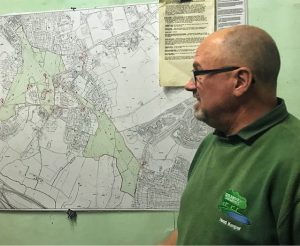

The morning patrol sees them drive around keeping an eye out for any problems that need to be addressed urgently – broken branches, trees down, fly tipping.
“The other week we had to clear an old shed that had just been fly tipped”, says Jonathan. He shows me photos of a huge heap of jagged wood and metal. “That’s 500 kilos that we had to take to the local tip, because someone else couldn’t be bothered to.”
They also stop at the Commons ponds to clear the litter. Their biggest gripe is people dumping household rubbish in public bins. “And dog poo”, adds Peter.
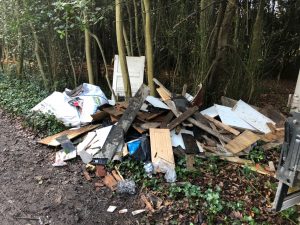
“During the summer, the problem is much worse. What has four wheels and flies? Our truck! That’s an old Goons gag, of course”, he adds.
“We clear roughly 250 kilos of rubbish a week”, says Jonathan. The worst offenders are drivers. “The Commons are criss-crossed by roads. In the summer there are 30 or 40 cans a day thrown out the window.”
Within five minutes of returning from the morning patrol, they’re planning the day ahead.
“Today we’ve been putting in posts to protect the Commons, to stop cars cutting across them”, Jonathan tells me. “One driver recently got his car stuck, he was trying to beat a traffic jam. What he didn’t realise was that this part of ground has loads of ant hills, and his car got stuck in one of them. They’re meadow ants. They’ve been there for hundreds of years”.
It’s clear that Jonathan and Peter are knowledgeable about the Commons, and immensely proud of its heritage.
“There are foxes, squirrels, we’ve even seen a stoat”, says Jonathan. “I wasn’t expecting that! It’s very rare to see them. It was one January day. We just stood there and watched, it didn’t see us, it was chasing after a mouse. Slow worms, common lizards, we even have a couple of badger setts. They only come out at night, so you don’t tend to see them.”
“In September we do a bat patrol, an expert comes and brings all the detectors. Prickend Pond is the best place for bats. Soprano pipistrelles, common pipistrelles, you see Daubenton’s bats around the ponds as they catch insects over water”.
What one one thing would make their job easier? “Being able to predict the weather three weeks in advance!” says Jonathan.
“In the summer the job involves a lot of grass cutting. Autumn into winter there’s a lot of tree work, scrub clearing – that’s small trees and plants like holly that are getting so dense that they’re taking over and nothing else will grow. We’re clearing scrub so that we have space to plant more trees to make it a more diverse habitat – you have to try to provide a balance for wildlife. We keep it as native as we can, we plant birch, ash, that kind of thing. We can only do scrub clearing until about March, when the birds start nesting.”
Helping them cut back the holly are a band of volunteers. “We have about 30 volunteers on our books”, says Jonathan, “and once a week between 12 and 15 of them turn up”.
“They have a great time”, adds Peter, “They have a laugh!”.
“Most people are very friendly”, says Jonathan. “The only problem we have occasionally – apart from litter – is that we have to make sure utilities aren’t digging without permission. They get permission from the Council of course, but sometimes they don’t realise that this is private land and they also need authority from the Board. Most people are surprised to learn that the land isn’t owned by Bromley, and we don’t work for the council. We’re a charity, Chislehurst Commons, and the bulk of the work is funded by donations.”
Every other month Jonathan and Peter do a guided walk through the Commons.
“We point out the work we’ve done”, says Jonathan, “People ask questions about the history of the Commons, and they tell us things as well. A lady recently informed us that there used to be a coaching inn at Robin Hood Lane, near Leesons Hill. The original Maidstone road came through the Commons”.
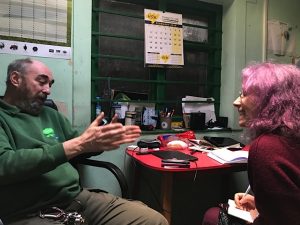
It seems that there’s always something new to learn. Peter tells me, “If I see a plant or a fungus or a bird I don’t recognise, I come in here and get one of those books down” – he points behind me to a shelf of reference books, sitting next to a collection of antique glass and earthenware bottles they’ve found in the course of their work.
“The Chislehurst Commons are unique,” says Jonathan. “The landscape is part of the Blackheath Beds. It’s very stony soil. All the ponds are old gravel pits, that’s why the Board was originally set up, to stop the destruction of the Commons.”
Just outside their base at the old Fire Station is the famous Cockpit, which is covered in acid grasses.
“We only cut the grass there once a year, and we have to rake it off so that there’s no residue left to add nutrients. We have to keep the land there as poor as possible, otherwise those native grasses would die out.”
“Anything you do on a lovely summer day is great”, adds Peter, “even picking up litter. And if Jonathan’s on holiday I bring my dog in and do a walking patrol.
Have you heard of the ‘dog tree’? It appears about 3 weeks before Christmas, it has baubles with all the names of the dogs that used to be walked here and have passed away. Then after Christmas it just disappears – we don’t take it down, the owners take care of that.”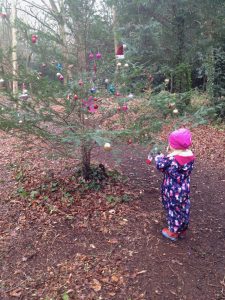

Jonathan and Peter even occasionally turn out on their days off. “I quite enjoy doing the events, like the summer fairs. We set up the equipment – we’re the muscle!” laughs Jonathan. “I’m on the water table for the Chislehurst Chase, the local 10k race. We’re there from about 7.30 in the morning.” His family often volunteers to help too. “We all think of the Commons as ours, we feel like we own it. And we’re really proud of looking after the War Memorial”, adds Peter.
There are some unexpected perks of the job.
“Whoever finds a fiver gets to keep it,” laughs Peter, “but he has to buy the cakes the next day!”
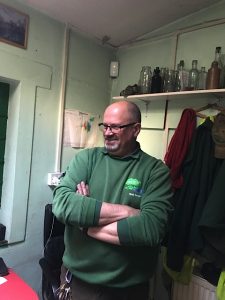
And what’s the last thing they do every day?
“Besides me kissing him goodnight?!” asks Peter, as they both collapse into laughter again.
“We make a list of things to do the following day, make sure the equipment is packed away, put the ‘denver boot’ back on the truck and lock everything up.”
“Every day is different”, says Head Keeper Jonathan. “I love it.”
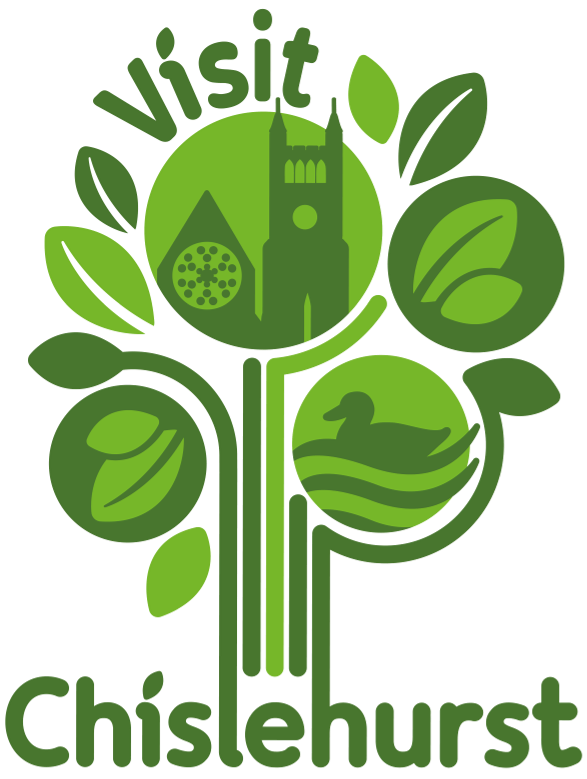
What happened please to Bernard Smith Head Common Keeper around 1970
I was a neighbour of his when we resided in Chislehurst